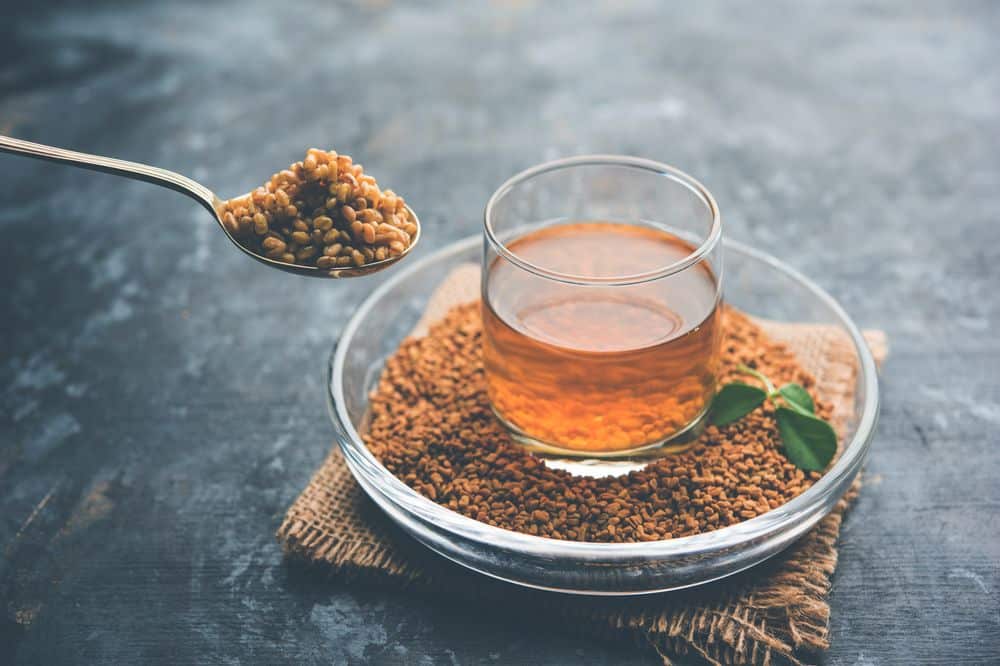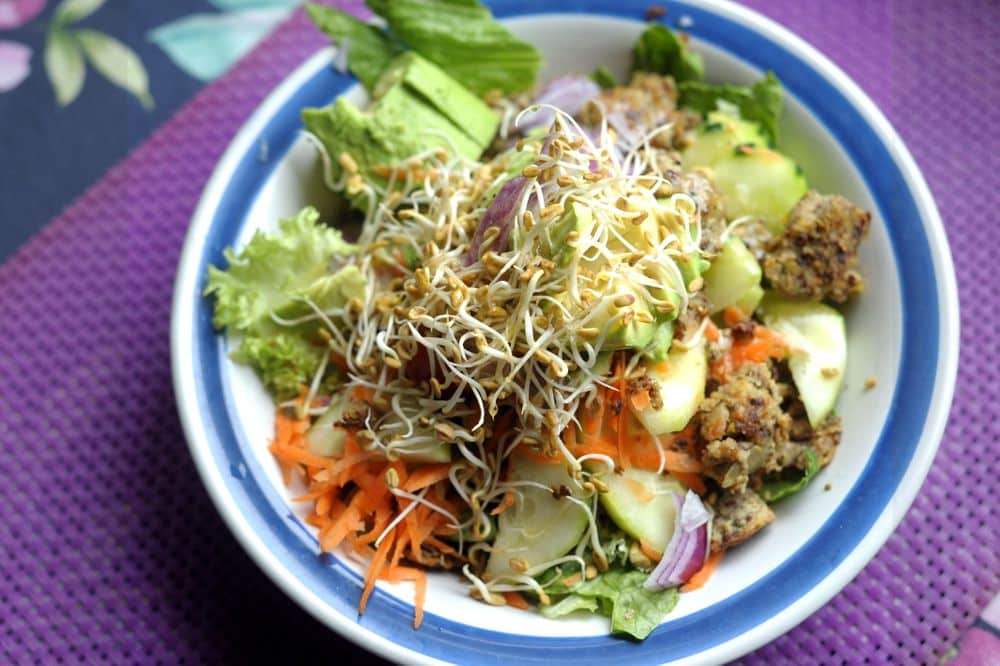Fenugreek Seeds – Benefits, Nutritional Value and Ways to Use

Hiral Patel
June 30, 2025

Hiral Patel
June 30, 2025
Fenugreek is scientifically known as Trigonella foenum-graecum Linn and Methi in India. It is a type of herb native to Asia and parts of Europe. In addition, people consume different parts of the herb, including the seeds and the leaves. Also, you can use fenugreek seeds in three forms: powdered form, raw seeds, or seed extracts. The seeds have high nutritional value.
In addition, they contain minerals and bioactive compounds and are a powerhouse of benefits. They have anti-cancer, anti-diabetic, hypocholesterolemia, anti-inflammatory effects, etc.
Fenugreek seeds are an everyday household staple in India and other Asian countries. It has been used as a traditional alternative medicine to relieve pain and other ailments. They are cuboidal in shape and dark yellow-brown.
Fenugreek seeds are a low-calorific food full of minerals, vitamins and carbohydrates, making them an exceptional food supplement. The nutritional value per 100g of fenugreek seeds is:
Fenugreek seeds also contain several bioactive compounds like phytochemicals. They are phenolic acids, galactomannan, steroids, flavonoids, alkaloids, and hydrocarbons.

Fenugreek seeds show potential anti-metastatic properties in several cancers. These include breast, skin, gastrointestinal tract, leukaemia, lung and prostate cancer.
A study reports the presence of diosgenin in fenugreek seeds. It helps synthesise cortisone and progesterone hormones. These hormones show anti-cancerous effects by hindering cell proliferation and enhancing cancerous cell death.
Additional research shows that fenugreek seeds are cytotoxic against colon cancer. It fights against leukaemia. In other words, it hinders the cell growth of tumour cells in both cases.
Furthermore, fenugreek hinders and prevents cancer growth, according to research. Moreover, fenugreek seeds are a rich source of antioxidants. Antioxidants remove free radicals present in the body. Free radicals are highly reactive species that can lead to DNA damage, mutations, and in the worst-case scenario, cancer. By reducing the number of free radicals in the body, fenugreek seeds prevent the onset of mutation-induced cancers.
Fenugreek seeds have anti-diabetic and hypoglycemic effects on people. Therefore, it helps manage type1 and type2 diabetes complications. In addition, research shows its usage as an anti-diabetic medication. Furthermore, fenugreek has a low glycemic index, making it a safe and healthy food for diabetes.
The compound 4-hydroxy isoleucine helps lower the amount of glucose present in the blood by increasing insulin secretion. Furthermore, it is a soluble fibre that prolongs the digestion of carbohydrates in the body, thus improving glucose homeostasis. In addition, the bioactive compound galactomannan present in fenugreek seeds shows anti-diabetic properties. Also, fenugreek seed extracts aids in glucose metabolism through the formation of a glucose transport molecule, GLUT-2, in the body.
Fenugreek seed mucilage shows anti-inflammatory effects. It reduces pain, swelling and promotes wound healing. A study reported that 4-hydroxy isoleucine plays a significant role in the anti-inflammatory effects of fenugreek.
It is a bioactive compound that inactivates several inflammation-inducing enzymes. Additional bioactive compounds that promote fenugreek’s anti-inflammatory responses include alkaloids, apigenin, and saponins. However, their exact function is debatable. The anti-inflammatory effects of fenugreek seeds result in a better immune system.
Many people have used fenugreek seeds to relieve pain and cramps. Historically, one took fenugreek seed extracts to reduce pain during childbirth and menstruation. Fenugreek seed water, or fenugreek seed tea, is still consumed to relieve cramps, nausea, and fatigue during menstruation.
Research credits these properties to the abundant minerals and nutrients present in the seeds. In addition, they promote haemoglobin synthesis in the body and provide energy, which regulates women’s overall health during menstruation. An additional benefit is the prevention of anaemia in women.
Several studies talk about the antifungal and antimicrobial properties of fenugreek seeds. The antimicrobial property is due to phenolic compounds and scopoletin. These compounds interfere with the metabolic process of several bacterial strains found in the gut and cause their death. Similarly, antifungal effects are due to flavonoids in fenugreek extracts. Consumption of fenugreek seeds can thus promote wound healing and aid in gastrointestinal disorders.
Among other benefits, fenugreek seeds lower serum cholesterol, triglycerides and LDL content in the blood. They result in hypocholesterolemia. It helps to reduce obesity and fasten weight loss. According to research, the bioactive compound saponin in fenugreek seeds is to thank for this property.
Saponin combines with bile acids to form large micelles in the intestines. The size of these micelles is too large to be absorbed in the body. Therefore, the unhealthy-lipid content in our bloodstream decreases. In the long term, this helps regulate heart health and overall metabolism.
Another way fenugreek seeds help in weight loss is through their high dietary fibre content. Fenugreek seeds are rich in mucilaginous fibre. This fibre has galactomannans. The high fibre content in the body helps lower glucose absorption, create a feeling of fullness, and manage bowel movements. In addition, the compound 4-hydroxy isoleucine helps lower the amount of glucose present in the blood by increasing insulin secretion. These mechanisms essentially lead to a healthier metabolism, thus leading to weight loss.
Fenugreek seeds are used as a natural remedy for hair loss or accelerating hair growth. They also have a use in preventing and treating dandruff. Additionally, they make hair follicles healthier. For maximum benefits, you can eat fenugreek seeds or apply their extracts topically on the scalp.
Consuming fenugreek seed water every morning on an empty stomach can regulate metabolism and offer several nutrients and minerals. The seeds can also be ground to a powder form and mixed with other spices to add to meals.
Fenugreek seeds have a low glycemic index, thus are an excellent snack for people suffering from type I or type II diabetes. Eat them as sprouts or simple dry seeds.
People suffering from hair loss or dandruff can either topically apply fenugreek seed extract on their scalp or take them as supplements.
Fenugreek seeds have a distinct aroma and flavour, which improve food taste. Use dry seeds or ground them into a powder and use them in recipes.

Servings: 1
Calories: 12
Preparation time: 10-12 mins.
You should drink fenugreek water on an empty stomach in the morning for maximum benefits. However, don’t drink more than 1-2 cups daily.
Various studies prove that regularly drinking fenugreek water on an empty stomach can accelerate weight loss. Additionally, fenugreek water reduces bloating and regulates gut health.

Servings: 2
Calories: 20
Preparation time: 15 mins
Enjoy the salad as a snack, an appetiser, or a side dish for lunch or dinner. It serves as a low-calorie snack and a diabetic snack. In addition, it is filling, contains fibres and helps in weight loss.
Consuming 1-2 teaspoons of fenugreek seeds regularly is entirely safe and beneficial to health. However, in some cases, it may cause potential side effects. These may include diarrhoea, bloating, upset stomach, gas, and a maple syrup-like odour in urine. In addition, consuming a large dosage of fenugreek seeds may lead to a decline in blood sugar.
In case of excess consumption, there is a possibility of liver toxicity. To add on, some people might be allergic to fenugreek, which may lead to symptoms including nasal congestion, rashes, coughing, wheezing, and facial swelling. Therefore, it is good not to consume fenugreek seeds in excess if you are pregnant.
It is essential to learn about allergens that cause such symptoms in your body. Then, consult with a physician if any of these symptoms persist. It is also important to remember that you should eat fenugreek seeds reasonably, just like anything else.
Problem: With lifestyle disorders like high blood sugar, high cholesterol and triglycerides being a concern for many, natural remedies that are backed by science is the need of the hour. One such potent herb is fenugreek seeds. Studies have shown that regular intake of fenugreek seeds lowers blood cholesterol, sugar levels and helps in pain management. It can be sprouted or used in the powdered form in a variety of dishes
5- 10 g fenugreek seeds are safe for daily consumption. Along with a well balanced diet and exercise routine, adding locally available and inexpensive fenugreek seeds is highly recommended.
Fenugreek seeds, obtained from a herb, offer a variety of health benefits, including weight loss, hypercholesterolemia, anti-inflammatory properties, antioxidants, anti-cancerous properties and anti-diabetic properties. Furthermore, one can consume them in several ways, which are pretty easy to prepare. In addition, these seeds are commercially available all year round and are affordable. Thus integrating fenugreek seeds into your diet will prove to have many positive impacts on your life.
Disclaimer: The purpose of this article is just to disperse knowledge and spread awareness. It does not intend to replace medical advice by professionals. For further information please contact our certified nutritionists Here.
A. Weight loss, hypercholesterolemia, anti-inflammatory characteristics, antioxidants, anti-cancerous qualities, and anti-diabetic properties are some of the benefits of fenugreek seeds.
A. You can eat fenugreek seeds in various ways, including dry seeds, seed extract or seed water, sprouts, powdered form, and as a component in a recipe to add a distinct flavour.
A. Yes, boiling fenugreek seeds in water is the most common way to consume them. It softens the seeds and allows the nutrients to be released. It also lessens their extreme bitterness, making them easier to chew and swallow.
A. Yes, taking a small amount (half to one teaspoon) of fenugreek seed daily can provide numerous health benefits such as decreasing total cholesterol, improving bowel motions, and possible remedies for digestive problems and heartburns.
A. According to health authorities at the University of Pittsburgh Medical Centre, the suggested daily dose of fenugreek is 5 to 30 g of defatted fenugreek seed powder up to three times daily. Fenugreek is typically taken before or during meals.
A. Fenugreek may cause diarrhoea, nausea, and other digestive system problems, as well as dizziness and headaches in some cases. Excessive doses may result in a harmful drop in blood sugar. Additionally, fenugreek may trigger allergic reactions in some individuals.
A. Yes, but it depends on the quantity. A few seeds will not make much of a difference. Fenugreek seeds absorb fluid; too many seeds may absorb too much of your digestive fluids. As a result, you should exercise caution when it comes to quantity.
A. Yes, multiple studies demonstrate that regularly drinking fenugreek water on an empty stomach speeds up the weight loss process, reduces bloating, and regulates gut health. However, daily use of fenugreek seeds should not exceed a tablespoon.
A. You should stop taking fenugreek seeds if you experience any adverse side effects, such as nasal congestion, rashes, coughing, wheezing, or face puffiness. Consult a doctor if any of these symptoms continue.
A. If taken in extreme quantities, fenugreek seeds may cause liver toxicity. Consult with a physician if this happens. However, it is essential to remember that one should take fenugreek seeds reasonably.
A. For the most part, no, fenugreek seeds help kidney function and decrease the chances of getting kidney stones. However, there may be some possible side effects like causing structural damage to the kidney.
A. Yes, fenugreek may help boost low testosterone and sperm levels. In a 2017 study, 50 male participants were given a fenugreek seed extract to consume for 12 weeks. As a result, approximately 85 per cent of the subjects had an enhanced sperm count. The results also show that the extract consistently increased mental alertness, mood, and libido.
A. Yes, fenugreek seeds are high in iron and protein, necessary for hair development. They also have a distinct composition of plant chemicals, such as flavonoids and saponins. These chemicals stimulate hair growth due to their anti-inflammatory and antifungal properties.
A. Pregnant women should avoid taking too many fenugreek seeds. It may result in abnormalities in the infant as well as premature contractions. In addition, taking fenugreek right before delivery may result in an unusual body odour in the newborn. People with surgery should also avoid fenugreek as it may slow blood clotting. It could result in more bleeding during and after surgery. Also, patients on diabetes medications should consult expert before adding fenugreek seeds in daily routine as taking fenugreek seeds


I’m 117pounds at 70yrs. ????